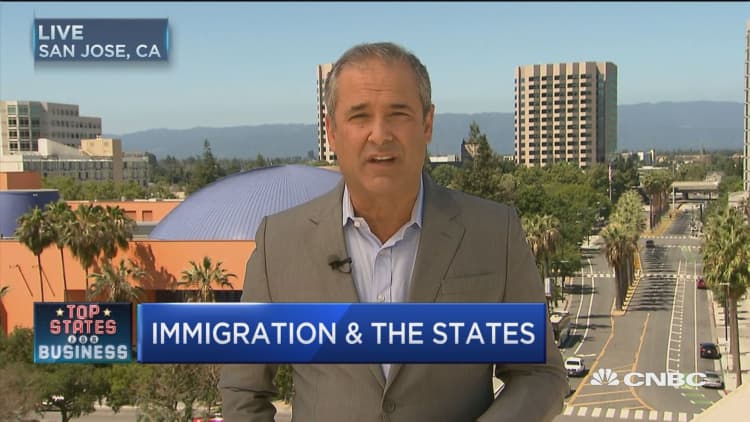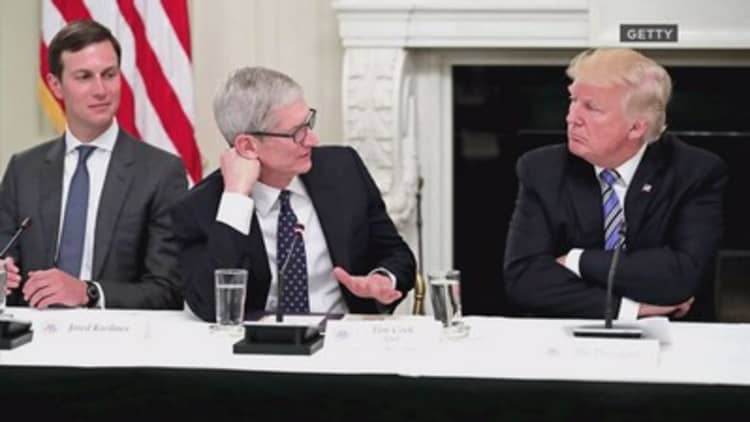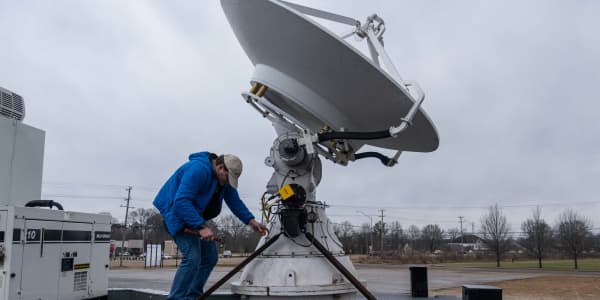
Tension over immigration reform is rising in Silicon Valley. The Supreme Court agreed Monday to let President Donald Trump's immigration travel ban go into effect for some travelers, reversing the actions of lower federal courts that put the controversial policy on hold. The court agreed to hear the case involving travelers from six Muslim-majority countries and all refugees in the fall, leaving open the chance it could reverse the verdict if challengers can prove it is illegal or unconstitutional.
This is the latest development on immigration policy that some technology companies are concerned about. Another big issue that could deliver a blow to Silicon Valley is the report last week that the Trump administration is reviewing and may scrap the new "start-up visa," which had been set to go into effect in July. The news leaked out just days after Apple CEO Tim Cook warned Trump at a White House tech CEO meeting that tech employees are "nervous" about his administration's approach to immigration.
The "start-up visa" proposed by President Obama last August grants foreign entrepreneurs starting businesses in the United States to gain temporary permission to be in the country and receive investment capital from certain qualified U.S. investors.
Trump has made it clear that under his "America First" administration, it will be harder for foreigners to obtain visas to work or travel to the United States. "Extreme vetting" at U.S. borders and Trump's proposed travel ban has many start-ups with fast-growing international operations concerned. In April the president signed an executive order for a comprehensive review of visa programs that allow U.S. companies to hire foreign workers. The H-1B visa has been a favorite of the tech industry, as it allows U.S. employers to temporarily employ foreign workers in specialty occupations.
The situation has entrepreneurial experts in the region speaking out. "In our politics today, there's this position being pushed that immigration is bad for America, and that certainly puts [the Silicon Valley] ecosystem at risk," said Michael Seibel, CEO and partner at Y Combinator, the seed accelerator that has spawned more than 1,450 companies since its founding in 2005, including tech giants Dropbox, Airbnb, Stripe and Reddit.
As Seibel points out, Silicon Valley is a "delicate ecosystem" that is a lot smaller than it seems, he said. Its unrivaled network of entrepreneurs and investors with experience building companies is what enables start-ups to thrive and eventually become giant corporations, employing thousands of Americans.
The California economy has thrived in part because of the influx of skilled immigrants who come from all over the world and build businesses, spend money and buy homes, said Seibel. It's been a key driver in the state's technology and innovation prowess.
But the ramifications of clamping down on immigration go well beyond California, he said. States throughout the United States are affected.
Statistics tell the story. According to the Kauffman Foundation, immigrants are more than twice as likely as non-immigrants to start a business. Taking that into account, it's not surprising that immigrants founded 51 percent of the current crop of billion-dollar U.S. start-ups, a recent nonpartisan study from the National Foundation for American Policy found. A start-up visa could create 1 million to 3.2 million new jobs over 10 years, according to the study.
Today, as start-up meccas are rising around the world, talented immigrants may choose to set up shop outside the United States, Seibel pointed out. Founders are questioning whether America is still as welcoming to immigrants as it has been in the past, and whether they can get to the United States to start a business or even travel here, he said. It's a daily topic of conversation, he revealed.
"The second we start to make this place less welcoming, the second we start losing our advantage," said Seibel. "America is participating in a competition for talent. If we change immigration policies and make it harder for smart people to come and stay, we're going to start losing this battle," said Seibel.
The administration's anti-immigration rhetoric is already having a chilling impact on H-1B visa applications throughout the nation, say experts. Employer applications for fiscal 2018 declined for the first time in years, according to a report from the U.S. Citizenship and Immigration Services released in April. The federal immigration agency received 199,000 applications this year, 37,000 less than the prior year.
California, Delaware, Massachusetts and New Jersey are the states in which employers file the most H-1B visa applications, according to a CNBC analysis of data from MyVisaJobs.com, which aggregates visa applications.
Still, the state-by-state data on H-1Bs can be misleading because of the way outsourcing companies manipulate the system, said former House Rep. Bruce Morrison, D-Conn., who is also the former chairman of the Immigration Subcommittee, who helped craft the H-1B visa bill in the 1990s.
America is participating in a competition for talent. If we change immigration policies and make it harder for smart people to come and stay, we're going to start losing this battle.Michael SeibelCEO and partner at Y Combinator
Morrison, who now runs Morrison Public Affairs Group and counts the technical professional organization IEEE as a client, has since changed his mind about the program, because outsourcing companies have abused it to replace Americans with cheap foreign labor, he said.
"That wasn't the intention of the original law, and frankly, I think that was a hijacking of the H-1B program," said Morrison.
Immigration advocates representing the tech industry are calling for reforms to the H-1B program to prevent outsourcing companies from using it to displace American workers, though a Bloomberg report found that some big tech companies have been complicit in this practice. They are also calling for more H-1B visas to be made available — the visas are currently capped at 85,000 per year — to alleviate the domestic shortfall in workers with science, technology, engineering and math (STEM) skills.
H-1B applications from big tech companies dwarf those filed by start-ups, but their concerns are just as important to the future of the industry, said Seibel, who would like to see the government set aside a number of H-1B visas for companies with fewer than 50 employees.
"The only way you get the next Google is if at some point it looks like a tech start-up," he said. "One to two hires happening is the difference between a company happening or not."
Dealing with today's challenges
For Dilawar Syed, who leads North America operations at the business software start-up Freshworks, the immigration issue is personal. "I have been through the challenges of the system and feel very strongly that it shouldn't have been so hard," said Syed.
Syed came to the United States from Pakistan on a student visa in 1991 and holds a computer science degree from the University of Texas at Austin and an MBA from the Wharton School at the University of Pennsylvania. He worked for years on an H-1B visa at Silicon Valley's big tech companies, including Yahoo and Oracle, before obtaining permanent residency and citizenship, allowing him the freedom to become an entrepreneur.
"Now I am in a position to hire people and would like to make sure our doors remain open to people of any background," said Syed.
Freshworks has raised $149 million in funding from U.S. backers, including Google Capital, Sequoia Capital, Accel Partners and Tiger Global. It employs 30 people in the United States and 1,000 globally. In recent months, employees traveling to the United States on H-1B visas for work and on B1 temporary business visas for meetings have found border agents to be "much more strict and at times awkward," he said.
"We have even considered having management meetings outside the U.S. so folks don't have to go through the process," said Syed.
There are not enough qualified Americans to fill the more than quarter-million open tech jobs, so Silicon Valley must do a better job of bringing more Americans into the tech industry, said Syed. As Freshworks looks to expand, it is looking outside the Bay Area — where the cost of doing business has skyrocketed — to cities with big university systems, like Ohio and Tennessee, said Syed.
Debunking the myth
The image that companies are scouring the world for highly-skilled foreigners is a myth, said Morrison. Almost all high-skilled H-1B workers come out of universities, and it's the recruitment of students that determines America's success on a global scale, he said.
Applications from foreign students from countries such as China, India and the Middle East declined this year at almost 40 percent of schools surveyed by the American Association of Collegiate Registrars and Admissions Officers, NBC reported in March.
To turn the tide, states can reexamine how they can make their workforce more attractive to employers through their university systems, said Morrison. Universities, unlike commercial enterprises, are not subject to annual federal caps on H-1Bs. As such, they are able to sponsor immigrants to come to the United States and work within the university system who can later apply for a second H-1B, which is not subject to the cap.
"I know Massachusetts has been very involved in this in particular," said Morrison.
It is up to states to be proactive in shaping the workforce by pushing Congress to increase the number of permanent resident green cards available to graduates of U.S. universities, he said.
WATCH:
Tim Cook told Trump tech employees are 'nervous' about immigration







